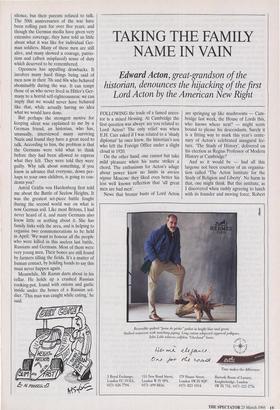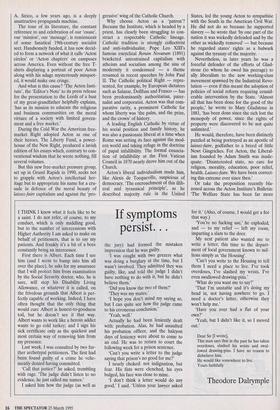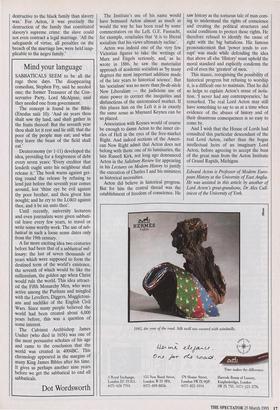TAKING THE FAMILY NAME IN VAIN
Edward Acton, great-grandson of the
historian, denounces the hijacking of the first Lord Acton by the American New Right
FOLLOWING the trade of a famed ances- tor is a mixed blessing. At Cambridge the first question was always: are you related to Lord Acton? The only relief was when E.H. Carr asked if I was related to a 'shady diplomat' he once knew, the historian's son who left the Foreign Office under a slight cloud in 1920.
On the other hand, one cannot but take mild pleasure when his name strikes a chord. The enthusiasm for Acton's adage about power knew no limits in ancien regime Moscow: they liked even better his less well known reflection that 'all great men are bad men'.
News that bronze busts of Lord Acton are springing up like mushrooms — Cam- bridge last week, the House of Lords this, who knows where next? — might seem bound to please his descendants. Surely it is a fitting way to mark this year's cente- nary of Acton's celebrated inaugural lec- ture, 'The Study of History', delivered on his election as Regius Professor of Modern History at Cambridge?
And so it would be — had all this largesse not been courtesy of an organisa- tion called 'The Acton Institute for the Study of Religion and Liberty'. No harm in that, one might think. But this institute, as I discovered when rashly agreeing to lunch with its founder and moving force, Robert A. Sirico, a few years ago, is a deeply unattractive propaganda machine.
The tone of its literature, the constant reference to and celebration of our 'cause', our 'mission', our 'message', is reminiscent of some fanatical 19th-century socialist sect. Handsomely funded, it has now decid- ed to form a network of what it calls 'Acton circles' or 'Acton chapters' on campuses across America. Even without the free T- shirts displaying a portrait of poor Acton along with his adage mysteriously misquot- ed, it would make one cringe.
And what is this cause? 'The Acton Insti- tute', the 'Editor's Note' to its press release for the presentation to the Lords of a bust of my great-grandfather helpfully explains, `has as its mission to educate the religious and business communities on the moral virtues of a society with limited govern- ment and a free market.'
During the Cold War the American free- market Right adopted Acton as one of their heroes. The Liberty Fund, a power- house of the New Right, produced a lavish edition of his essays which, contrary to con- ventional wisdom that he wrote nothing, fill several volumes.
But this new free-market pressure group, set up in Grand Rapids in 1990, seeks not to grapple with Acton's intellectual her- itage but to appropriate his name for a cru- sade in defence of the moral beauty of laissez-faire capitalism and against the 'pro- gressive' wing of the Catholic Church.
Why choose Acton as a 'patron'? Because the Institute, which is headed by a priest, has clearly been struggling to con- struct a respectable Catholic lineage. Catholic tradition is strongly collectivist and anti-individualist. Pope Leo XIII's famous encyclical Rerum Novarum (1891) bracketed unrestrained capitalism with atheism and socialism among the sins of modernity it condemned — a theme resumed in recent speeches by John Paul II. The Catholic political Right — repre- sented, for example, by European dictators such as Salazar, Donnas and Franco — has been predominantly authoritarian, pater- nalist and corporatist. Acton was that com- parative rarity, a prominent Catholic for whom liberty was 'the palm, and the prize, and the crown' of history.
A leading English Catholic by virtue of his social position and family history, he was also a passionate liberal at a time when Rome was setting its face against the mod- ern world and taking refuge in the doctrine of papal infallibility. The formal enuncia- tion of infallibility at the First Vatican Council in 1870 nearly drove him out of the Church.
Acton's liberal individualism made him, like Alexis de Tocqueville, suspicious of democracy. 'The encroachment of this illib- eral and tyrannical principle', as he described majority rule in the United States, led the young Acton to sympathise with the South in the American Civil War. He did not do so because he supported slavery — he wrote that `by one part of the nation it was wickedly defended and by the other as wickedly removed' — but because he regarded states' rights as a bulwark against the tyranny of the majority.
Nevertheless, in later years he was a forceful defender of the efforts of Glad- stone (to whom he owed his peerage) to ally liberalism to the new working-class movement spawned by the Industrial Revo- lution — even if this meant the adoption of policies of social reform requiring consid- erable intervention by the State. 'Almost all that has been done for the good of the people,' he wrote to Mary Gladstone in 1881, 'has been done since the rich lost the monopoly of power, since the rights of property were discovered to be not quite unlimited.'
He would, therefore, have been distinctly puzzled at being portrayed as an apostle of laissez-faire, godfather to a breed of little Newt Gingriches. For Acton, the Liberal- ism founded by Adam Smith was inade- quate: 'Disinterested state, no care for religion, morality, education, poor relief, health. Laissez-faire. We have been correct- ing this extreme ever since then.'
Or take the proposition recently bla- zoned across the Acton Institute's Bulletin: The Welfare State has been far more destructive to the black family than slavery was.' For Acton, it was precisely the destruction of the family that constituted slavery's supreme crime: the slave could not even contract a legal marriage. 'All the safeguards of virtue, all penalties on the breach of the marriage law, were held inap- plicable to the negro family.' The Institute's use of his name would have bemused Acton almost as much as would the way he has been read by some commentators on the Left. G.E. Fasnacht, for example, concludes that 'it is to liberal socialism that his views ultimately incline'.
Acton was indeed one of the very few Victorian figures to take the writings of Marx and Engels seriously, and, as he wrote in 1886, he saw the materialist approach of academic socialists as 'by many degrees the most important addition made of the late years to historical science'. But his 'socialism' was no more than fin-de-siecle New Liberalism — the judicious use of state power to correct the inequities and disfunctions of the unrestrained market. If this places him on the Left it is in exactly the same sense as Maynard Keynes can be so placed. Association with Keynes would of course be enough to damn Acton to the inner cir- cles of Hell in the eyes of the free-market Right. And indeed sections of the Ameri- can New Right admit that Acton does not belong with them: one of its luminaries, the late Russell Kirk, not long ago denounced Acton in the Salisbury Review for appearing in his Lectures on Modern History to justify the execution of Charles I and his ministers as historical necessities.
Acton did believe in historical progress. But for him the central thread was the establishment of freedom of conscience. He saw history as the tortuous tale of man com- ing to understand the rights of conscience and creating the political structures and social conditions to protect those rights. He therefore refused to identify the cause of right with the big battalions. His famous pronouncement that 'power tends to cor- rupt' was made while defending the idea that above all else 'History' must uphold the moral standard and explicitly condemn the evil of even the 'greatest' of men.
This stance, recognising the possibility of historical progress but refusing to worship it, is a difficult one to maintain. That he did so helps to explain Acton's sense of isola- tion. 'I never had any contemporaries,' he remarked. The real Lord Acton may still have something to say to us at a time when evidence of the abuses of history and of their disastrous consequences is so easy to come by.
And I wish that the House of Lords had consulted this particular descendant of the real Lord Acton, rather than the bogus intellectual heirs of an imaginary Lord Acton, before agreeing to accept the bust of the great man from the Acton Institute of Grand Rapids, Michigan.
Edward Acton is Professor of Modern Euro- pean History at the University of East Anglia. He was assisted in this article by another of Lord Acton's great-grandsons, Dr Alex Call- inicos of the University of York




























































 Previous page
Previous page